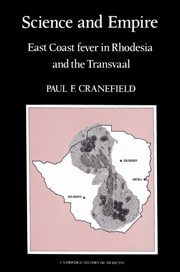Book contents
- Frontmatter
- Contents
- List of illustrations
- Preface
- Acknowledgments
- 1 Prologue
- 2 The places and the players
- 3 A new disease?
- 4 The search for an expert
- 5 Robert Koch in Bulawayo
- 6 Joseph Chamberlain
- 7 Arnold Theiler, Charles Lounsbury and Duncan Hutcheon
- 8 The fight against East Coast fever
- 9 The African-owned cattle in Rhodesia
- 10 Two more parasites and another new disease
- 11 What is East Coast fever?
- 12 Epilogue
- Notes and references
- Index
6 - Joseph Chamberlain
Published online by Cambridge University Press: 19 January 2010
- Frontmatter
- Contents
- List of illustrations
- Preface
- Acknowledgments
- 1 Prologue
- 2 The places and the players
- 3 A new disease?
- 4 The search for an expert
- 5 Robert Koch in Bulawayo
- 6 Joseph Chamberlain
- 7 Arnold Theiler, Charles Lounsbury and Duncan Hutcheon
- 8 The fight against East Coast fever
- 9 The African-owned cattle in Rhodesia
- 10 Two more parasites and another new disease
- 11 What is East Coast fever?
- 12 Epilogue
- Notes and references
- Index
Summary
In late October, 1902, Joseph Chamberlain tried and failed to prevent Robert Koch from being employed to investigate East Coast fever in Rhodesia. If that brief episode were all that Chamberlain had to do with science or the empire at the turn of the century, he would hardly deserve even this short chapter. But he was involved in the study of rinderpest, he was involved in Rhodesian and South African policies, he was involved in the Jameson raid, which influenced so many later events, and he and Milner were involved in the events that led to the Boer War, in the war itself, and in the reconstruction that followed it. And in him and in his career, an interest in science and a belief in empire were united as they seldom have been in one person before or since.
Who was Joseph Chamberlain, apart from being the father of Neville Chamberlain? Why, in 1902, was he so bitterly opposed to the Chartered Company's proposal to employ a German bacteriologist? Why did he express his opposition to the employment of Koch by using a phrase associated with trade and manufacturing: “made in Germany?” And why, on October 27, 1902, was he certain that if an English alternative to Koch existed, that alternative could be identified by the Royal Society?
The brief answers to those questions are that Joseph Chamberlain was, in 1902, Colonial Secretary, as he had been since 1895.
- Type
- Chapter
- Information
- Science and EmpireEast Coast Fever in Rhodesia and the Transvaal, pp. 121 - 136Publisher: Cambridge University PressPrint publication year: 1991



